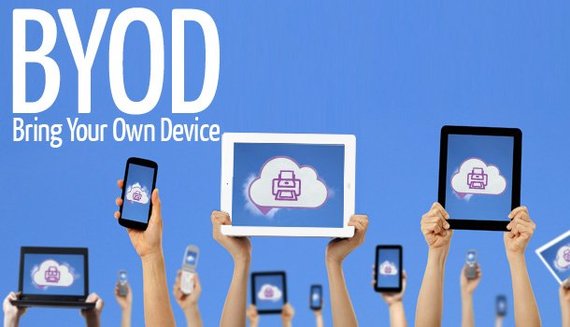Many industry researchers predict that BYOD (Bring Your Own Device) will become an increasingly accepted concept for startups. There are numerous advantages for companies that let employees bring their own devices to work. There are also plenty of disadvantages. Security risks, for instance, may increase when companies let their startup employees use personal devices for client related billable projects.
This leads to an important question: is BYOD worth the security risk? The answer depends on what startup founders expect to get from BYOD and whether they are willing to tackle any security risks head-on.
Advantages of BYOD
It's important to understand the advantages of BYOD before letting your employees bring their devices to work.
Startups with comprehensive BYOD plans tend to have more productive employees. According to research, BYOD employees offer 37 minutes more of productive time each week. This increased productivity accounts for about $350 in increased revenue per employee each year. U.S. companies with comprehensive BYOD plans may get up to $3,150 "more bottom-line value" from each employee per year as well.
Those numbers will appeal to any startup interested in lowering costs without negatively affecting productivity.
BYOD employees aren't tied to their desks the way many people are. They can work from practically anywhere. This does more than just add to productivity. It also has soft benefits, such as increasing employee satisfaction. A study from IBM shows that 83 percent of BYOD employees consider their devices more crucial than morning coffee.
BYOD employees often feel more satisfied because they:
-Can take advantage of flexible schedules without falling behind at work
-Use devices that they already understand and feel comfortable with
-Carry a single mobile device instead of one for personal use and one for professional use
Common Security Risks from BYOD
These are compelling reasons to adopt a BYOD program for your startup. Security risks, however, should give you pause.
Perhaps the biggest security problem comes from third-party apps that employees download on their personal devices. Many of those apps demand access to information stored on devices. This could give software developers access to sensitive information, including client data and industry secrets.
This becomes even more problematic when employees download malware masquerading as software vetted by Apple, Google, and other companies that sell apps.
Security risks also come from employees who may lose devices. A distracted person could easily leave his or her smartphone on the train during a busy morning.
Theft can also create security leaks. According to Consumer Reports, there were 3.1 million smartphone thefts in 2013. Most of those thieves won't know that they have access to potentially lucrative information. As a stolen device makes it way through the black market, though, more people will come in contact with it. Eventually, someone could identify and use your startup's sensitive information.
Reducing the Security Risks of BYOD
Training could substantially lower the security risks created by BYOD. Many startup employees simply do not understand the value of sensitive information. Others do not know that downloading certain apps could create problems for themselves, their employers, and clients.
Luckily, there are already several templates online that can help you develop a BYOD policy that works.
It's important to understand that your startup already faces some security risks, even if it doesn't have a BYOD program. About half of employees in the U.S. admit to storing work-related information on their personal devices whether their employees have BYOD programs or not.
Keeping this in mind, it makes sense to start a BYOD program that teaches your startup employees how to use their own devices safely. What do you think? Has a BYOD program worked for your startup or not?
